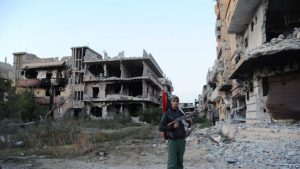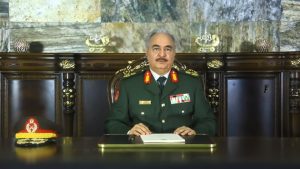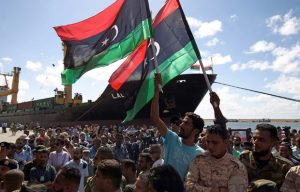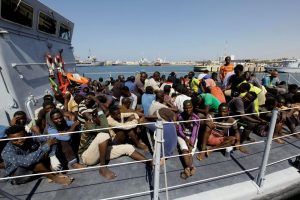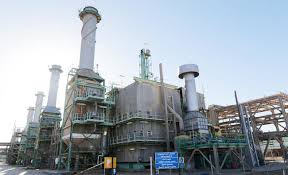As mentioned last week, the privileges of being an academic include the many learning events regularly available. At the tail of last week’s Column, I mentioned that Mambayya House (Bayero University Kano’s Aminu Kano Centre for Democratic Research and Training which is aptly located in the late Mallam Aminu Kano’s residence) last week hosted African American political science scholar Prof Horace G. Campbell, Kwame Nkrumah Chair at the Institute of African Studies of the University of Ghana. Prof Campbell, who could ideologically be placed to the Left of Leftism, spoke on “NATO and the Destruction of Libya” and how the murder of Gaddafi precipitated the destablising upheavals all across the Sahara and the Sahel, where guns have become cheaper than water, figuratively-speaking.
I spoke to my colleague Mustafa Ibrahim Chinade (musti4cn@gmail.com), Editor of “BUK Today”, who was event rapporteur at Mambayya, and the following are some of our joint thoughts and recollections.
The 60-slide Campbell presentation (available from Mustafa for those who want to read more) was an emotional and heart-wrenching experience for the audience as he espoused his argument about the reasons for the NATO intervention in Libya, the immediate consequences and what lessons for African leaders, intellectuals and citizens. Given the restlessness that had gripped the youths of North African region in general, Campbell argued, perceptive readers would tend to think that the outbreak of pro-democracy agitations in Libya provided the immediate background for the NATO intervention.
But the scholar pushed back the roots of the invasion plans to the US’s Bush Administration, quoting Jeremy Keenan in his book “Dark Sahara and Dying Sahara”, the subtitle of which was an entire statement: “The Bush Administration fabricated an entire front in the ‘war on terror’ for its own political purposes.” Campbell pointed out that lack of “firm evidence that ‘terrorists’ from Afghanistan, Pakistan, or the Middle East were taking the Sahel route or indigenous cases of terrorism” did not deter the US. It is no wonder therefore, he argued, that the launch of a Sahara front in the ‘war on terror’ created immense anger, frustration, rebellion, political instability, and insecurity across the entire region.
The next critical factor, according to the scholar, was a secret agenda of regime change. Campbell quoted a British Parliamentary Committee report that accused the British government, and by extension NATO, of pursuing “an opportunistic policy of regime change,” despite telling parliament in March 2011 the contrary. The report gave as evidence false claims that Gaddafi ‘was about to carry out a massacre of genocidal proportions,’ rushing into a military intervention without first pursuing other options and deliberately creating a fertile ground for the emergence of militias and ISIS offshoot.
And it was no surprise that the West was not happy with the North African country of Libya or its fiery leader Gaddafi. After all, it could easily be recalled that Libya (or more precisely Gaddafi) had for long defied the West and had bank-rolled the liberation struggles in Angola, Namibia, Zimbabwe and South Africa. Therefore, the NATO war was actually punishment time.
The major trigger that translated the US and NATO agenda into military action was perhaps the French national interest that wanted Gaddafi eliminated because of the threat he posed as France’s rival on the African continent; his grandiose plan to fund the long-sought and long-hoped-for diversion of the excess waters of the River Congo to feed the dying Lake Chad, his plans for the Trans-African highway and, particularly, his advocacy for and near-realisation of a single African currency tied to gold and backed by Libya’s considerable reserves.
According to Campbell, then French President Nicolas Sarkozy explicitly stated the reasons for the attack on Libya in a leaked email he sent to Hillary Clinton, then US Secretary of State, as “a desire to gain a greater share of Libya’s oil production, increase French influence in North Africa, improve his [Sarcozy’s] internal political situation in France, provide the French military with an opportunity to reassert its position in the world, [and] address the concerns of his advisors over Gaddafi’s long term plans to supplant France as the dominant power in Francophone Africa.”
The immediate consequence of the invasion of Libya was the death of over 50,000 people, creating over two million refugees (or one third of the total Libyan population of six million), destruction of civil order and plunder of Libyan oil and gas resources. Plus all the Sahelian upheavals burnished and furnished with cheap weapons. The $65-$70 billion foreign reserves belonging to Libya’s Central Bank and the $67 billion of the Libyan Investment Authority funds remain frozen – perhaps to be appropriated in the near future by the invaders as part-payment for rebuilding what they destroyed, the balance as debt on the unborn.
Campbell then asked African intellectuals, citizens and leaders to remember the assassination of their leaders by Western powers, urging them to support the Pan Africanist Movement’s backing of an AU peace process and call for investigation of NATO for exceeding its mandate and challenging the UN for failing to protect the Libyan people as provided for in UN Resolution 1973 of 2011.
Further, he advocated, African countries and leaders must pick up where Gaddafi left off – for Africa to be connected politically and economically, the natural way (even if quite expensive) would be to channelise and connect the continent’s great water bodies through linking its mighty rivers. Such connections could recharge almost dead water bodies such as Lake Chad (incidentally the subject of a Presidential Summit in Abuja this week) and provide alternative means of commerce, transport and improved livelihoods in the continent.
The very next day after the Campbell Lecture (after which the scholar interestingly headed to Damaturu, Yobe State, a couple of days before the Dapchi Abduction), Mambayya House again hosted another intellectual discourse – Ambassador of the Republic of Ireland to Nigeria Sean Hoy came in to speak about the Irish Peace Process. He presented the lead paper to a panel discussion on “The Road to Peace: Lessons from the Northern Ireland Peace Process”. Lessons, essentially, for Nigeria and Africa.
The envoy traced the roots of the Northern Ireland Conflict to the post-independence partition of Ireland by the United Kingdom (UK) in 1922: 26 of Ireland’s 32 counties gained independence (from the UK) while the other six counties formed Northern Ireland and remained part of the UK. The lesson of the Northern Ireland peace process, he said, is imperative of dialogue and perseverance, as “the road to peace in any situation will involve a process where both sides will have to listen to each other and to be open to change. Negotiation is not about victory but compromise”. He also cautioned about “external forces, driven by wider agendas …keen to manipulate local unrest…there is evidence that these groups will also seek to pick scabs and reignite conflict where possible. This is a growing phenomenon across West Africa”.
Two days, two different speakers, two different perspectives – all leading to one objective: a better Africa and, by extension, a better Nigeria.
If only the leaders would hear!
Libyan warlord recruited African mercenaries for ongoing fighting in Libya’s south
The commander of the Sixth Brigade Infantry Ahmeid Al-Ataybi, said the clashes in Sabha, Libya’s south, is between Operation Dignity forces led by Khalifa Haftar and forces loyal Government of National Accord (GNA.)
The fight in Libya’s Sabha is not between tribes, he explained.
Al-Ataybi told Tanasuh TV Channel on Wednesday that the Sixth Brigade Infantry is part of the Defense Ministry of the GNA and the other side of the clashes are groups loyal to so-called general command of Libyan army led by Haftar in eastern Libya.
“We call on the Presidential Council to issue a statement condemning the attack on the Sixth Brigade Infantry and we call on all free revolutionaries to help our fighters in defending Sabha and the south.” He added.
“We have not received any support or calls from the GNA or its Defense Ministry.” Al-Ataybi further added.
He accused Haftar of being the mastermind of the clashes in the south and of recruiting mercenaries from Chad, Niger and Sudan to help him control the south.
Sabha has been experiencing an unrest and continued clashes between two tribes: Tubu and Awlad Sulaiman, with the mayor escalating the issue on the media and saying it is a foreign occupation that is taking place in Sabha.
The latest week-long injuries and deaths details show that over 6 were killed and scores injured so far in the fighting, local media reported Thursday.
Libya: New Gaddafi figure waits in the wings but says he has ‘no time for democracy’
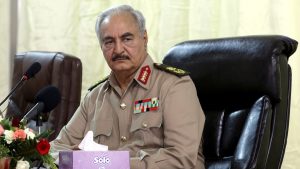
In Libya, a dominant military figure stands out as a possible new leader of a unified country – that is, of course, if he wins at the polls – or even if he doesn’t. But can the UN or the West even organize an election?
Some seven months have passed since Libya’s two rival leaders met with the newly elected French President Emmanuel Macron in Paris. One is Fayez al-Sarraj, prime minister of the Government of National Accord, who lives in Tripoli and is supported by the UN and the West.
The other, Khalifa Haftar, is a military commander who controls Benghazi and can take credit for crushing Al Qaeda. The West considers him a maverick military type, however, who has little time for the tedious travails of diplomacy or democracy.
Can efforts by Macron and Russia’s Foreign Minister Sergey Lavrov find a tangible solution in the war-torn country, which is crudely split into two regions? Or is the despondent reaction of UN negotiators in a confidential report a recent indication that the West is in a quandary over Khalifa Haftar?
Some would argue that the 75-year-old field marshal is a product of the West, having arrived in Libya to topple Gaddafi after an exile in the US. He initially fought alongside Al Qaeda forces, but subsequently killed many in more recent years.
Still, Western powers are concerned that backing such a figure could have grave consequences in a country that is already such a catastrophic failure of Western intervention, with sex slavery and arms sales now rife after a UN mandate went so spectacularly awry.
Analysts are still dismayed by Khalifa Haftar’s coup de theatre last September, when he showed up at talks in Tunis with armed men in blatant disregard for a UN weapons embargo. A foreign envoy, quoted by Reuters, later said what might be read in years to come as a chilling eulogy for Libya: “He accepts elections as an acceptable way [to run], provided he will be the winner.”
What an endorsement for a leader who was once one of Gaddafi’s closest confidants.
On the seventh anniversary of the beleaguered UN decision to support Gaddafi’s opponents, which ultimately became a clumsy Western-backed coup d’etat ending in the colonel’s brutal murder, analysts will be watching Haftar like a hawk, wondering when his patience will expire.
“Not a convinced democrat”
On his side, Haftar has a coalition of regular army (Libyan National Army, LNA) soldiers and militias totaling around 35,000 personnel, and he controls the bulk of the country’s oil fields, as well as the eastern-based parliament. But is it enough to wield against UN-backed Prime Minister of the Libyan Government of National Accord Fayez al-Sarraj? In Tripoli, where power is still rooted, Sarraj controls the central bank, a deep-water port, and the national oil company.
Haftar is an old man with little patience, however, and time is running out. His own aides told a German fringe media outlet last year that he is ready to move militarily on Tripoli.
So where’s the delay? What’s holding Haftar back?
According to Reuters just this week though, diplomats suggest that the promise of national polls could delay Haftar’s advance. It is not clear how they can be held, however, with a lack of a unifying candidate or updated election laws.
It is also possible that his backers – the UAE and Egypt – are the steady hand on Haftar’s radical plans, as neither country has an appetite for a proxy war in Libya. Russia, which prefers him to Sarraj, will also be reluctant to back him in a military campaign.
Some geopolitical experts believe his self-styled LNA is not strong enough for any such campaign. “With fewer than 25,000 troops, the LNA is neither mobile, cohesive nor powerful enough to embark upon such an open-ended undertaking” argues Jalel Harchaoui, who teaches geopolitics at the Universite de Versailles and Universite Paris-Est.
Mad dogs and ‘blowback’
Haftar may well be humoring his sponsors and the UN by going through the motions of elections before going ahead with his plan to take Tripoli and total control of Libya. Taking Tripoli and keeping Tripoli would be two different things, however. If the incumbent Sarraj is dethroned, it would put the UN and the West in an even more difficult position than it is in today.
It’s not just about East meets West. Blowback from the West’s support of ISIS to overthrow Gaddafi in Tripoli will inevitably increase – just as it surfaced in the form of the Manchester concert bombing, which was carried out by a young Brit who fought with ISIS in Tripoli with the tacit approval of the UK security services.
The new resistance against Haftar may well involve Islamic extremists, as there are still many left who his own forces did not kill off; as well as disgruntled Salafists within his own ranks, who have resorted to infighting.
France, Britain and the US may well be pushed into a position where they will be left with a difficult decision. They could support him, as he would ensure the production of one billion barrels a day of oil is sustained; or, like in Syria, they could support opposition groups (including extremists) because they see a new Gaddafi taking over Libya as millions drown in rivers of blood.
Wholesale human-rights violations are certainly likely to dominate the media landscape under such a brutal dictator, who allegedly uses ISIS-type executions against his enemies. Haftar rose to prominence through a botched Western intervention that left Libya, according to a recent report, as the largest wholesale arms vendor in the entire world. Al Qaeda and ISIS are its main clients outside of the country.
If he takes the place of Gaddafi as a result of Western diplomacy failing and Trump deciding that Haftar is the new “mad dog” (as Reagan called Gaddafi in 1986), then extremist groups in Libya will no doubt be supported once again to oust an unruly Libyan leader who the West struggles to either understand or control.
Misrata Free Zone signs Deal to Develop Port
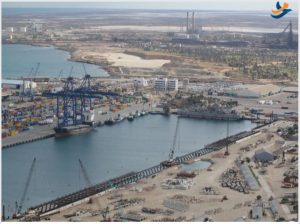
Misrata Free Zone et la société britannique Mabco Holding auraient signé un accord de coentreprise pour mettre en œuvre un «projet de commerce de transit stratégique, qui comprend un terminal de fret reliant les zones franches de Misrata (A et B à l’autoroute côtière, l’infrastructure du site (B) de la zone franche de Misurata “.
Le projet doit être réalisé sur une base DBOT (Conception – Construction – Exploitation – Transfert de propriété).
Mabco Holding a été créée en août 2016 et son unique administrateur est Jalal Baayou, un ressortissant libyen.
Libya “Wins Case” against Brazilian Companies
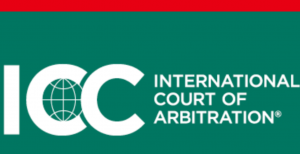
Xinhua rapporte que le gouvernement libyen a gagné une action en justice contre deux entreprises de construction brésiliennes qui ont réclamé 96 millions de dollars de dommages et intérêts en raison de la suspension de leurs projets en Libye.
Le Bureau d’audit libyen a déclaré que la Cour internationale d’arbitrage, qui fait partie de la Chambre de commerce internationale (CCI) à Paris, a rejeté l’affaire déposée contre la Libye par une société libyro-brésilienne et la société brésilienne Odebrecht.
Les projets d’infrastructure ont été suspendus en 2011 en raison de la détérioration des conditions de sécurité.
Libya’s huge riches could help bring an end to political violence
It may come as a surprise to many that despite the deep conflict and negative economic growth in the last three years in Libya, the state of the Libyan economy is much healthier than that of many other countries, including neighbouring ones.
The fundamentals of Libya’s economy are strong, and the potential for achieving huge growth and high levels of prosperity are in place. Libya has hardly any external debts to international financial institutions, while other nearby countries recorded billions in debt in 2017, including Egypt ($67bn), Morocco ($47bn) and Tunisia ($28bn).
Fighting for Libya’s wealth
Libya also has $67bn in national sovereign fund assets scattered internationally, which have been frozen by the UN since 2011. The country also possesses huge reserves of oil and gas, with crude oil reserves of 48 billion barrels – the largest in Africa and ninth-largest globally. Libya is also ranked fifth-highest in the world for recoverable shale oil reserves, estimated at 26 billion barrels.
Its various mineral reserves, which have not yet been mined on a commercial scale, include some very large gold reserves, especially in the south.
Yet, sadly, this huge wealth has been something of a curse for Libyans and a root cause of conflict. The rentier nature of the Libyan economy means that the state is the main source of income and wealth. This has led, in the absence of a social contract setting out a fair and peaceful wealth-sharing system, to Libyans taking up arms and violence, especially in the last three years.
The conflict has been essentially over who controls political power and, consequently, wealth.
The Libyan economy is in a much healthier position that that of neighbouring Tunisia and Egypt, who are shackled with high foreign debt, high unemployment and limited natural resources
Another intrinsic factor damaging the Libyan economy is a deep-rooted culture of corruption that eats up most government-allocated budgets. A lack of transparency and accountability mechanisms, along with the very weak institutional capacity to implement good governance policies, constitutes a major weakness and economic drain.
The violence in Libya has been fuelled by countries, near and far, who greedily want a share of its wealth. Conflict over the control of oil installations, including oil fields and export terminals, brought Libya’s daily export of crude oil down to a mere 200,000 barrels per day (bpd) in 2014-15 from a high of 1.5 million bpd before that.
This sharp drop in oil exports caused foreign currency revenues to plummet and the Libyan dinar to lose value sharply against foreign currencies. Other effects included spiralling inflation, rising prices and a severe shortage of liquidity in the banks, resulting in the grave socioeconomic suffering of ordinary Libyans.
Signs of improvement
The conflict has also led, over the last three years, to a split in the most important economic institutions of the country: the Central Bank of Libya, the National Oil Corporation and the Libyan Investment Authority.
However, by the end of 2017, some economic factors started to appear more positive: Libya exported the most oil in four years in 2017, reaching around one million bpd, amid signs that an improving security environment was enticing some of the world’s largest oil companies back to Libya.
Vitally needed hard currency from oil exports tripled in 2017 to $14bn, compared with $4.8bn in 2016. In a sign of fresh confidence, giants Royal Dutch Shell and BP recently signed annual deals to buy Libyan crude for the first time in years.
The Libyan central bank announced it would raise the annual amount of foreign currency available to each family member to $500 in 2018 from $400 in 2017. This has eased access to foreign currency at the much lower official exchange rate, compared with the almost-six-times-higher parallel black market rate.
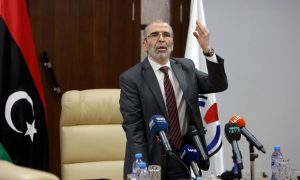
In recent years, another draining factor on Libya’s economy has been the smuggling of heavily subsidised fuel and basic food commodities to neighbouring countries and across the sea. According to Mustafa Sanalla, the head of the Libyan National Oil Corporation, smuggling by land and sea through Tunisia might account for as much as 40 percent of the country’s consumption.
But a recent crackdown on smuggling networks has been saving Libya hundreds of millions in state money lost to smugglers and their receiving customers outside the country.
Impacts on neighbouring countries
Another welcome development is the strengthening of the Libyan dinar by more than 50 percent against foreign currencies on the black market. The dinar has been helped by a hard currency influx from the central bank, as rising oil prices and boosted export revenue have relieved financial pressure on Libya.
The central bank has also channelled more money to importers since the start of the year, helping to lower the prices of goods and inflation.
Rising oil exports and crude prices are generating more foreign revenue for Libya, closer to pre-conflict levels. The real potential of the Libyan economy, however, comes from the huge natural wealth resources and the country’s large frozen assets. Libya’s lack of debts to international financial institutions gives it the freedom to adopt fiscal policies without international pressure or interference.
All of this should show Libyan factions that the prize for ending their conflict, leading to stability and unity, will be highly rewarding. Significant economic improvements would encourage ordinary Libyans to participate in planned elections, offering a glimpse of a light at the end of the tunnel.
The Libyan economy is in a much healthier position than that of neighbouring Tunisia and Egypt, who are shackled with high foreign debt, high unemployment and limited natural resources. Libya has, over the decades, attracted hundreds of thousands of Egyptian and Tunisian workers – and after the conflict ends, it could easily attract more, helping to boost their economies.
Egypt has strong leverage on some of the factions in the Libyan conflict, including General Khalifa Haftar, and could hold genuine sway when it comes to bringing about a political accord and peace. Geopolitically, a stable, prosperous Libya would be a great economic benefit to its neighbours and much less of a threat to their national security.
– Guma El-Gamaty est un universitaire et un politicien libyen qui dirige le Parti Taghyeer en Libye et est membre du processus de dialogue politique libyen soutenu par l’ONU.
Les opinions exprimées dans cet article appartiennent à l’auteur et ne reflètent pas nécessairement la ligne éditoriale de Middle East Eye
Photo: Les Libyens brandissent leur drapeau national au port de Benghazi, fermé pendant trois ans à cause des groupes rebelles qui occupent la ville de l’est de la Libye, lors d’une cérémonie marquant sa réouverture en octobre 2017 (AFP)
Seven years on from 17th February revolution, Libya still losing its journalists: RSF
On the eve of the seventh anniversary of Libya’s 17th February Revolution, Reporters Without Borders (RSF) has condemned the impunity for violence against journalists in Libya forcing them to flee abroad since 2014. The political and military split between the west and east of Libya has made journalistic independence impossible and turned them into targets, RSF said in a statement.
The full statement read as follows:
‘‘The crisis for press freedom in Libya has reached an unprecedented level seven years after the country’s revolution. The open conflict between two rival governments has made journalism extremely dangerous. Reporters Without Borders (RSF) condemns the impunity for violence against journalists, who continue to flee abroad.
The press freedom that began to develop in 2011 has been obliterated since then by political conflict and violence. The state has been torn apart by the power struggle between two rival factions, one in the west and one in the east, a fight that has made journalistic independence impossible and has turned journalists in targets.
At least 18 journalists have been killed since the revolution. The two main military factions undermining the state since 2014 are “Al Karama” in Benghazi and “Fajr Libya” in Tripoli. News reporting has become virtually impossible because of the political polarization. Silencing journalists is a permanent goal for the many militias in both factions and their commanders.
In these circumstances and given the prevailing impunity for violence, journalists often have no choice but to flee abroad. Libya has been steadily losing its journalists and media outlets. According to RSF’s tally, 67 journalists have fled the country and eight Libyan media outlets are now operating from bases in other Middle Eastern countries.
RSF has also registered many cases of disappearances, abduction and torture, especially this year. In most of these cases, the terrorized victims or their families did not want to be identified.
Annabaa TV stopped broadcasting on 15 March 2017 when its Tripoli suburb headquarters were set on fire by one of western Libya’s militias. This militia also obtained a list of the TV channel’s employees and posted it online. The publication of the list – giving their full names, the department where they worked and their salaries – triggered a wave online hate comments against the TV channel’s journalists, who were suddenly very exposed.
RSF and the Libyan Centre for Freedom of Press (LCFP) set up a crisis unit with the aim of assisting Annabaa TV’s journalists and, if necessary, helping them to leave Libya to guarantee their safety. Since then, 40 requests for help have been received by the crisis unit, and assistance has been provided to the 13 journalists most in danger, who were able to move to Tunisia and subsequently move again to Turkey to resume working for Annabaa TV after it relocated there.
“The situation for journalists and media in Libya is untenable,” RSF said. “The country is haemorrhaging journalists, who prefer to go into exile in order to continue reporting or chose to stop all journalistic activity because it has become too dangerous. Those who decide to stay are trapped and must choose between the rival factions. Media freedom and independence is nonetheless crucial for democracy and the rule of law.”
Enthusiasm crushed by instability
The months that followed Muammar Gaddafi’s overthrow in 2011 saw the emergence of new media that displayed incredible energy and enthusiasm, but the enthusiasm was unable to resist the ensuing political instability and violence. The crimes against press freedom have been ignored and the perpetrators have enjoyed complete impunity.
Legislative progress has meanwhile been slow and inadequate. In November 2017, RSF and seven other free speech and press freedom NGOs sent a letter to the Libyan constitution drafting committee calling for amendments to the draft constitution so as to bring it into line with international standards for protecting free speech and press freedom.
A constitution that guarantees press freedom, the confidentiality of journalists’ sources and the safety of journalists would sent a powerful message to all those who violate media freedom every day, a message that would help combat the prevailing impunity for crimes of violence against journalists.
Opinion poll show little support in western Libya for new elections or Saif Al-Islam; strong support for new constitution and disbanding militias
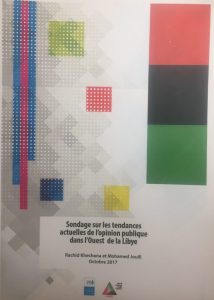
Few Libyans in the west of the country believe that new elections will end the country’s current situation, an opinion poll published today has indicated.
Carried out in Tripoli and four west Libyan towns, it suggests that no more than eight percent of respondents believe that new elections will resolve the crisis. Moreover, only 37 percent – a little over a third – say that they will take part in them when they occur while 27 percent say they will not. Another 37 percent say they have not made up their minds as yet.
As to how they might vote, just 17 percent say they will trust political parties. The other 83 percent reject this, saying they can support only independents.
The poll, carried out in the capital, Gharyan, Sabratha, Sorman and Zuwara, also shows that of those asked, there is little faith in a consensus government solving the country’s problems: a mere 7 percent back it.
Support of Saif Al-Islam Qaddafi taking over the country fares only marginally better, with just 10 percent supporting the idea.
The way out of the crisis most favoured by those polled is the establishment of a constitution (with 34 percent support), dissolution of the militas at 26 percent and military rule 12.5 percent.
The findings were unveiled today in Tunis, ironically at the same Africa Hotel where yesterday the Qaddafi family lawyer claimed that Libyans were eagerly awaiting Saif Al-Islam’s return to political power.
Asked who is responsible for the current crisis, 29 percent blame the militias, 26 percent the country’s successive governments since the revolution, 20 percent outside influence and 12 percent Libyan political parties and movements.
Some four percent blame tribal leaders.
Then asked directly what they think about the militias, a large majority say they protected the revolution but must now go: 75 percent want them disbanded.
Other findings from the poll show that 43 percent of Libyans, or at least those in the west of the country, think the 2011 revolution was due to outside influence, compared to 46 percent saying it was a wholly Libyan revolt.
A massive 91 percent say that all governments since the revolution have failed to deliver to aims of the revolution and 92 percent say that corruption has increased since the overthrow of the Qaddafi regime.
One of the other not-unexpected findings is that 87 percent are opposed to a federal system in Libya. In Zuwara, the “capital” of the country’s Amazigh community, though, support for federalism is relatively strong, at 43 percent. In Tripoli, it is just 12 percent and in Gharyan, eight percent.
Despite the fact that 96 percent of those question say that they are unhappy or seriously unhappy about the situation in Libya at present, there is, surprisingly, considerable optimism about the future. Some 19 percent say they are optimistic about things getting better in the near future, while a further 44 percent say they are “very optimistic”.
The polling was carried out by the Tunis-based Centre Maghrebin d’Etudes sur la Libye (CMEL) between 20 July and 8 August. Some 1,211 people were interviewed, split almost evenly between males and females. All were over 18 years of age.
Unveiling the findings today, CMEL’s Rachid Khechana said that they unlined the need to find a political solution soon, to reestablish institutions of state and ensure the militias were disbanded.
It had not been easy doing the polling, he said. But the intention was to cover other areas in further polls. The plan was to train more pollsters, either in Tripoli if the security situation permitted, or in Tunis if not.
Migrant search and rescue: a view from the waters off Libya
It’s 5.30am, and under a pinkish sky in waters north of Libya, the crew of Aquarius, a ship chartered by the French-German NGO SOS Méditerranée is preparing to bring on board 741 migrants who had been rescued by an offshore supply vessel a day earlier.
A rib boat shuttles back and forth, bringing to safety a dozen or so shell-shocked looking women, some heavily pregnant or with burns due to oil spills on cheaply-made rubber boats, a three-month-old baby, and men suffering from scabies.
The process takes around four hours, but there is no time to rest: soon after, the team is called to rescue almost 200 more people crammed into two rubber boats floating nearby.
Aquarius had left the port of Pozzallo in Sicily about 24 hours earlier. Before each journey, the crew of around 35 people, made up of medics and volunteers, never knows what to expect. Sometimes they wait for days before making a rescue.
On this particular day, June 27th, they saved 1,032 people – a new record since the ship started search and rescue operations in the Mediterranean in 2015.
It took a further 48 hours for the ship to return to Italy, with the team working relentlessly to assist migrants, who spent the two nights spread out on the ship’s decks.
It was during this time the weary crew heard about Italy’s threat to close the country’s ports unless the EU helped shoulder the burden of a migrant crisis that has worsened in recent months: the number arriving on Italy’s southern shores increased by 70 percent during the first six months of this year compared to the same period in 2016. An estimated 2,000 people drowned along the way.
Crew members described Italy’s move as a “cry for help” from the EU. But the plea was swiftly ignored, with both France and Austria deploying measures to ensure migrants remain in Italy.
The NGOs themselves have shouldered much criticism in recent months. In May, Carmelo Zuccaro, a Sicilian magistrate, told a government committee that there are people among them who are “not exactly compatible with philanthropists”. Unsurprisingly, politicians from Italy’s far-right Northern League and the populist Five Star Movement seized upon his comments, suggesting that the rescue ships are little more than a taxi service across the sea.
That couldn’t be further from the truth. It’s not easy to get a place aboard Aquarius. Furthermore, it’s dangerous. It’s not unusual for the ships to be shot at when in waters close to Libya. Last September the Libyan navy admitted to staging an attack that saw the rescue ship Bourbon Argos pelted with bullets. The crew hid in a safe room, thinking the attackers would seize them or sink the boat.
A similar scene unfolded aboard Aquarius in May when the Libyan coastguard arrived during a rescue, raised their guns to the sky and pulled the trigger – a tactic used to panic migrants in an attempt to bring them back to Libya.
The crew also works relentlessly with a huge risk to their health.
Oil Blockade “a National Tragedy”
The National Oil Corporation (NOC) says more than 360,000 barrels per day of Libyan crude oil production has been shut in by what it describes as a “criminal militia” operating in Western Libya, at a cost to the country of $160 million in lost production.
“These gangsters are not only harming the country but their own people,” said NOC chairman Mustafa Sanalla. “I call on tribal leaders to cut out this cancer once and for all, by withdrawing tribal protection from these gangsters unless they lift the blockade unconditionally.”
The militia, which calls itself the Rayayina Patrols Brigade, illegally shut the trunk crude oil pipeline (Line 30) from the Sharara oil field to Zawiya at the Rayayina valve on 19th August 2017, cutting production by an estimated 283,000 bpd. The militia also illegally closed Line 18 from Hamada to Zawiya on 25th August, shutting 8,000 bpd, and broke into the control room at the El-Feel field on 26th August 2017, shutting down 70,000 bpd of production there.
Force majeure has been announced at all three fields, and NOC has lodged a formal complaint with the General Prosecutor, naming two militia leaders, Ashraf el-Qaraj and Ali Belaezi.
The Rayayina Patrols Brigade claims to be a unit of the Petroleum Facilities Guard southern division. However, Brigadier General Idriss Boukhamada, the PFG commander, denied any affiliation with the group. “This is a rogue militia. It does not act with the authority of the PFG,” he said.
The Sharara blockade has had knock-on effects.The pipeline valves have been damaged by the illicit closures, raising the risk of an explosion in the crude oil pipelines. And Zawiya refinery, which depends on crude oil from Sharara, will stop producing essential fuels for local consumption unless alternative crude oil is supplied by sea.
المركز المغاربي للأبحاث حول ليبيا
تعريف:
تأسس المركز المغاربي للأبحاث حول ليبيا في جوان - يونيو 2015 في تونس، وهو أول مركز من نوعه يعمل بكل استقلالية من أجل تعميق المعرفة بليبيا في جميع المجالات والقطاعات، ويرفد بالمادة العلمية جهود المجتمع المدني في ليبيا لإقامة الحكم الرشيد، المبني على التعددية والتداول السلمي واحترام حقوق الإنسان . مؤسس المركز: الإعلامي والباحث التونسي رشيد خشانة يقوم المركز بنشر مقالات وأوراق بحثية بالعربية والأنكليزية والفرنسية، ويُقيم مؤتمرات وندوات علمية، وباكورة نشاطاته ندوة حول "إسهام المجتمع المدني في إعادة الاستقرار والانتقال الديمقراطي بليبيا" يومي 5 و6 أكتوبر 2015 بتونس العاصمة.
موقع "ليبيا الجديدة"
موقع إخباري وتحليلي يبث الأخبار السريعة والتقارير السياسية والاقتصادية والثقافية والاجتماعية عن ليبيا، ديدنُه حق المواطن في الإعلام، ورائدُه التحري والدقة، وضالتُه الحقيقة، وأفقهُ المغرب العربي الكبير. يتبنى الموقع أهداف ثورة 17 فبراير ومبادئها السامية ويسعى للمساهمة في بناء ليبيا الجديدة القائمة على الديمقراطية واحترام حقوق الانسان والحكم الرشيد.

